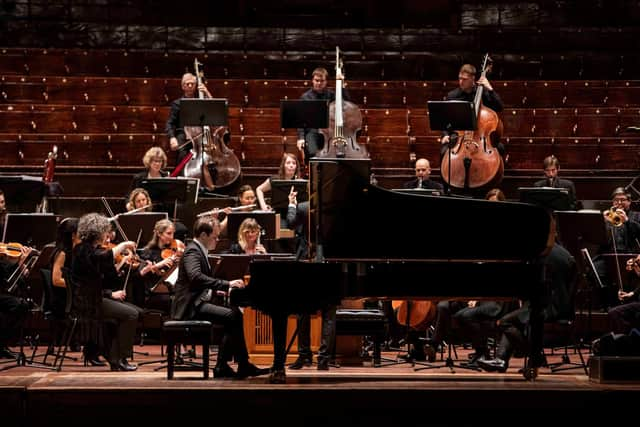Music review: SCO, Maxim Emelyanychev and Benjamin Grosvenor, Usher Hall, Edinburgh
SCO, Maxim Emelyanychev and Benjamin Grosvenor, Usher Hall, Edinburgh ****
Anyone still labouring under the impression that Felix Mendelssohn is merely a purveyor of pretty, easy-listening trifles would have had that belief roundly challenged by pianist Benjamin Grosvenor’s powerful account of the composer’s First Piano Concerto with the Scottish Chamber Orchestra. It was urgent, sometimes brittle, but with bracing clarity matched by fleet-fingered precision – and, more importantly, Grosvenor made a strong case for depths and subtleties from the composer that are too often overlooked.
Advertisement
Hide AdAdvertisement
Hide AdHe and conductor Maxim Emelyanychev seemed entirely of one mind in the piece – something even more gratifying in its particularly intricate interplay between soloist and orchestra – and, like Grosvenor with his sometimes steely pianism, Emelyanychev wasn’t afraid to bring out a hard edge here, or push the orchestra forward there. It made the champagne-popping finale feel all the more like a joyful release, though there was little relaxation in tempo or urgency. By contrast, Grosvenor’s encore – Schumann’s Abendlied – slowed time almost to a standstill, so that he could contemplate every harmony, its voicing and balance, in a fascinating, quietly audacious account.


Emelyanychev had kicked the concert off with the high drama of Brahms’s Tragic Overture: the SCO strings in particular had a rugged richness as they dug into the composer’s expressive lines, and even just Emelyanychev’s shaping of Brahms’s closing chord showed how much the conductor’s immense care with detail can make a performance so thrillingly vivid. The richness and urgency from earlier were back after the interval in a Schumann Fourth Symphony that flew by, pushed hard in Emelyanychev’s brisk but never breathless account, with a winning mix of depth and transparency of sound that only a smaller orchestra can achieve. As so often, though, it was the conductor’s evident strength of conviction, and compelling need to communicate that belief, that made his account so rewarding – and such a revelatory match for Grosvenor earlier in the evening.